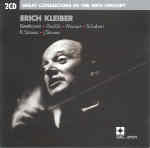That Erich Kleiber was a major conductor is evident to anyone familiar with his Decca recordings of Strauss’ Rosenkavalier, Mozart’s Marriage of Figaro, and the electrifying Beethoven Third and Fifth Symphonies that had such an impact in the early days of LP. But before those late forays into the recording studio and despite his three-decades-long international career, Kleiber made relatively few records and many of those were not especially attractive due to a stiffness that derived from his intense dislike of the recording process. The booklet in this Kleiber entry in EMI’s Great Conductors of the 20th Century series quotes him as saying: “A man who listens only to records is like one who eats only canned meat.” So rather than recycle his familiar Decca LPs, EMI has included alongside some of his canned meat products three major works in live concert performances, adding to the sum of available Kleiber recordings if not to a reputation eroded by the passage of time (these days he’s better known as Carlos Kleiber’s father than as a conductor of comparable stature who premiered Berg’s Wozzeck in 1925 ).
Schubert’s spring-like Fifth Symphony, in a glowing 1953 Hamburg concert, opens the set on a promising note. This is an important addition to the sparse Kleiber discography, perfectly paced with just the right relaxed touch tempering the brisk forward momentum. Kleiber is less driven than the near-contemporaneous Toscanini, less warm than the later Bruno Walter, less elegant than Beecham; but he somehow combines elements of all three into a convincing whole. Indeed, his Andante movement is as poetically lyrical as any in the catalog, never slowing to an adagio pace, always flowing, with tender phrasing that brings out its beauty. The Menuetto is boldly bracing and the outer movements fly by with brio.
The other top performance is the second CD’s lead-off selection, a 1949 London studio recording of Mozart’s G minor Symphony. Sonics here are less full and warm than the Schubert captured by the German radio engineers, and are further marred by the shrill violins that typified Decca’s 1940s orchestral recordings. But the bass is solid and there’s an overall vibrancy to the London Philharmonic’s sound. This is Mozart’s clarinet-less version and here, as in the Schubert, exposition repeats are dropped–and yet the performance still projects power and depth. Kleiber’s fast-paced interpretation isn’t far from what we expect from today’s historically-oriented ensembles, so the opening Molto allegro goes like the wind and the finale swings. Kleiber never stops to smell the roses in the Andante, which has a natural, graceful flow, and his Menuetto movement adds a dash of delicacy to the vigor of his reading.
The only other performance of note here is an unbuttoned live reading of Richard Strauss’ Till Eulenspiegel’s Merry Pranks, a down-and-dirty interpretation that’s tremendously exciting: winds toss satiric barbs, strings drip with sarcasm, flinging quicksilver arrows aimed at authority, and Kleiber stresses the pomposity of the march to the cheeky, nose-thumbing ending. Although the recording derives from the same 1953 Hamburg concert that produced the Schubert, it lacks transparency as the larger orchestra’s climaxes and the active percussion tend to become cloudy.
After the abovementioned three performances, disappointment sets in. The live 1955 Czech reading of Beethoven’s “Pastoral” takes a back seat to Kleiber’s earlier studio recordings of the work. It’s a sluggish, matter-of-fact reading, with slow movements taken at first-rehearsal speeds until the peasant’s rush for shelter in the tornado-like Storm, after which it picks up a bit. Dvorák’s Carnival Overture and two Strauss waltzes from 1948 are undercut by thick recorded sound. Though the calm central section of the Dvorák appeals, the disappearing percussion and foggy climaxes don’t, and the London Philharmonic lacks the innate feel for the Strauss rhythms exhibited in a 1929 version of the Du und Du Waltz with the Vienna Philharmonic, which gets more lifelike sound than the London items made two decades later. While this is an interesting release, it’s too bad that EMI couldn’t come up with examples of Kleiber’s pioneering efforts in modern music to give a more rounded picture of his career.
































